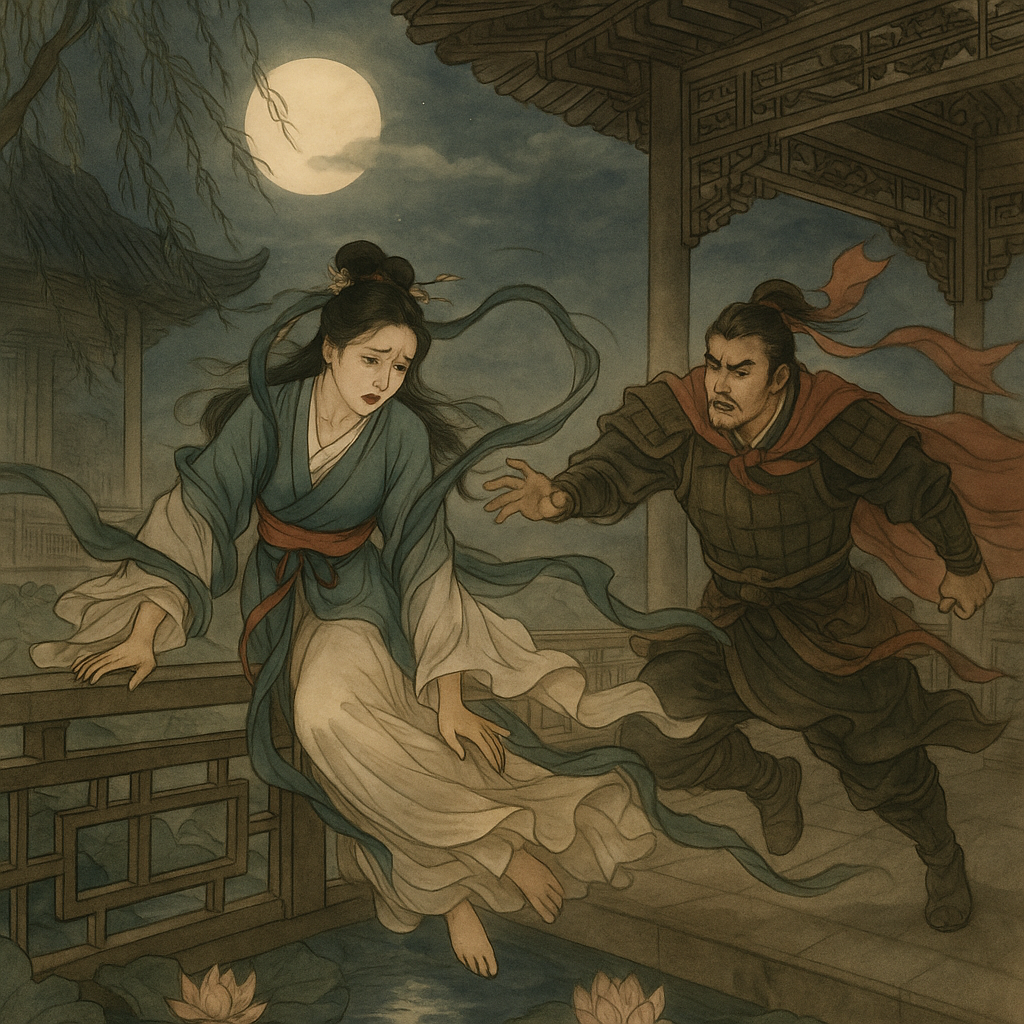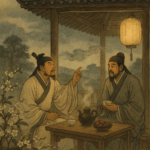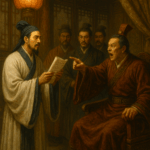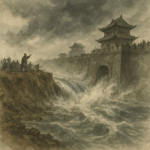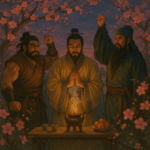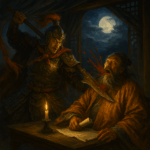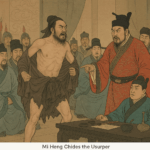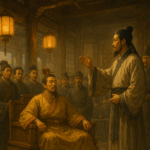Kuai Liang said, “Now that Sun Jian lies dead and his sons are but youths, we should strike swiftly upon the weakened Eastern Wu. If we do nothing but bury his body and disperse our troops, Liu Biao in Jingzhou will only grow stronger, posing an ever-greater threat.”
Liu Biao replied, “I cannot leave Huang Zu, who fights loyally in my camp, abandoned to his fate.”
Kuai Liang countered, “What dishonor is there in sacrificing one fool like Huang Zu to win all of Jiangdong?”
Liu Biao shook his head. “My bond with Huang Zu is as close as flesh and blood; it would be unthinkable to betray him.”
So they sent Huan Jie back under solemn oath to exchange Sun Jian’s remains for Huang Zu’s freedom.
Sun Ce fulfilled the bargain, rescuing Huang Zu, then returned to Eastern Wu to give his father a proper burial on the plains of Qu’e. Once the mourning rites were complete, he made his camp at Jiangdu, welcomed scholars and warriors alike, humbly listened to their counsel—and soon heroes from all corners flocked to his banner.
Meanwhile, in Chang’an, Chancellor Dong Zhuo learned of Sun Jian’s death and exclaimed, “One of my greatest foes is finally gone!” Hearing that Sun Jian’s eldest, Sun Ce, was seventeen, he dismissed him as no threat. Henceforth Dong Zhuo grew ever more insolent. He arrogated to himself the title “Senior Father,” entering the court with imperial ceremonial drills as if he were the Son of Heaven. He ennobled his brother Dong Min as Left General and Marquis of Hu, made his nephew Dong Huang Palace Attendant and commander of the Imperial Guards, and raised all his kinsmen—young or old—to the rank of marquis.
Two hundred and fifty li outside Chang’an, he ordered the construction of the “Wei Fortress.” Twenty-five thousand laborers toiled to build walls as lofty and thick as the capital’s, inside which palaces, granaries stocked with two decades’ worth of grain, and the finest young men and women—eight hundred in all—were quartered. Jewels, silks, and precious objects filled the vaults to overflowing. Dong Zhuo came and went with half-monthly frequency, and ministers were routinely summoned to his encampment outside the West Gate, where he would dine and carouse beneath his field pavilions.
One day he held a banquet outside the West Gate. The officials gathered in their finest; but as they feasted, Dong Zhuo received hundreds of surrendered soldiers from the North, whom he ordered dragged forward. Some had their limbs hacked off, others their eyes gouged, still others their tongues severed—while a great cauldron boiled alive those deemed most contemptible. Their shrieks shook heaven and earth; the assembled dignitaries trembled and could barely eat, whereas Dong Zhuo dined and laughed on as though watching a play.
Another day at the provincial hall, he gathered his ministers in two facing lines. After several rounds of wine, Lü Bu strode in and whispered in Dong Zhuo’s ear. Dong Zhuo laughed, “So that was the secret!” and bade his guards drag the Minister of Works, Zhang Wen, from his seat. Not long after, a crimson platter appeared before the hall bearing Zhang Wen’s severed head. The courtiers froze with horror—until Dong Zhuo declared, “Fear not! Zhang Wen conspired with Yuan Shu to harm me and sent a letter accusing my son, Lü Bu, of treason. Thus I slew him. You, my loyal ministers, have no cause for alarm.” The assembly dispersed in sullen relief.
That night Wang Yun, the Minister over the Masses, lay restless in his manor, haunted by the day’s horrors. Late under a bright moon he wandered into the rear garden and stopped beneath a flowering wisteria. He heard soft sighs by a peony arbor and, stepping closer, saw the palace songstress Diao Chan weeping there.
Diao Chan, plucked from her family in her girlhood to train in dance and song, was now beyond twenty years old and the favored “daughter” of Wang Yun’s household. Seeing him, she knelt in astonishment.
Wang Yun cried, “What idyll of secret sorrow brings you here?”
Startled, Diao Chan rose. “My lord, I dare not hide anything from you.”
“Speak freely,” he urged.
“I have lived all my days in your grace and courtesy,” she replied, “yet I have never seen a shadow upon your brow until this day. Your two eyebrows worry across your face, and you dare not let anyone ask why. When I saw you pacing in anxious thought, I feared some great burden lay upon you. If I might serve you, I would give my life. All that I have is yours to command.”
Wang Yun struck the ground with his staff. “Who would ever imagine the fate of the Han empire lies in a songstress’s hands? Come with me to the Painted Chamber.”
There he bade out the maids, seated Diao Chan upon a rosewood stool, and knelt before her. Surprised, she cried, “What madness is this?”
He sobbed, “Our people hang between life and death, our sovereign’s fate like an egg ready to break. Only you can save them! The villain Dong Zhuo plots to usurp the throne, and in court no plan avails. You must play your part in the Link-and-Chain Ruse: first let me offer you in marriage to Lü Bu, then promise you to Dong Zhuo himself. Once he lusts for you, Lü Bu’s loyalty will waver; he will rise and slay his adoptive father—thus ridding the realm of Dong Zhuo’s evil. Will you do this?”
Diao Chan rose, her eyes shining. “I swear on all I hold dear—my life is yours to use.”
Wang Yun rose. “Should the plot be revealed, our families will die. Will you still stand by me?”
Diao Chan bowed solemnly. “If I fail, let me be cut to pieces—what am I in the face of this great cause?”
The next day Wang Yun sent a chest of pearls and had a master craftsman fashion a golden crown. Under cover of dawn, a messenger slipped the treasure into Lü Bu’s hands. Overjoyed, Lü Bu rode to Wang Yun’s residence to offer thanks. Wang Yun served him a banquet, greeting him at the gate and seating him in the inner hall. Lü Bu asked, “Why such courtesy?”
“Because today there is no greater hero in the realm than you,” Wang Yun replied.
Flattered, Lü Bu drank his fill. Wang Yun bade the servants leave, keeping only a few handmaidens to pour wine. When the wine had flowed to half the cups, Wang Yun announced, “Come, my child—bring in the one I have promised you.” Moments later two palace attendants led forth Diao Chan, resplendent in her court finery.
Lü Bu’s eyes widened. Wang Yun said, “This is Diao Chan. I spoke with Dong Zhuo: she is meant for your marriage. If you accept her, vow to serve me forever.”
Lü Bu rose to salute Diao Chan. “If I win her, I will serve you as a dog or horse!”
Wang Yun smiled. “Soon I shall present her to your home—my thanks will know no limit.”
Lü Bu left with his heart soaring.
A few days later, Wang Yun greeted Dong Zhuo at court and persuaded him, under false pretense, to a banquet at his manor. There he lavished flattery, praising Dong Zhuo’s virtue and comparing him to the ancient sage-kings. Dong Zhuo, pleased beyond measure, accepted Wang Yun’s hospitality. That night Wang Yun ushered him to the inner pavilion and had Diao Chan perform a private dance. Her fluttering steps and subtle glances enchanted Dong Zhuo completely. He showered her with praise and vowed to take her as his stepdaughter for his son Lü Bu. Wang Yun bowed and called for a carriage to escort her to Dong Zhuo’s mansion.
On his way home, Lü Bu encountered Wang Yun again, panting with jealousy. “You promised me Diao Chan, yet I now hear she has gone to Dong Zhuo!”
Wang Yun feigned confusion: “Yesterday the Grand Chancellor said he would pay me a visit here, and we prepared a feast for him. He asked for Diao Chan, and I could not refuse.”
Lü Bu’s anger melted into shame. “I was mistaken—please forgive me.”
Wang Yun smiled. “Come again tonight—she will be here.”
The next evening Lü Bu returned, seeking Diao Chan in every quarter of Dong Zhuo’s palace, but found only silence. He spied her through a window, weeping by the pond under the moonlight. Her reflection trembled in the water as though her sorrow had a life of its own. Lü Bu’s heart trembled; he crept closer, then withdrew in agony.
When Dong Zhuo later fell ill with a mild fever, Diao Chan tended him day and night, removing his robe herself. Lü Bu slipped into the bedchamber to greet his foster father; Diao Chan, hidden behind the bedchamber curtains, trembled as she saw Lü Bu’s form. Lü Bu’s heart quaked at her tears.
Dong Zhuo, half-asleep, noticed Lü Bu’s rapt attention and flew into a jealous rage: “You dare to toy with my concubine?” He expelled Lü Bu from the hall. Insulted, Lü Bu went to confide in Li Ru, who hurried to Dong Zhuo: “Great Chancellor, if you wish to claim the realm you must coddle Lü Bu’s heart. Spurn him and he may rebel.”
Dong Zhuo summoned Lü Bu again, showered him with gifts, and begged his forgiveness. Lü Bu returned to his post but remained ever restless, his mind upon Diao Chan.
When Dong Zhuo recovered, he held court as usual with Lü Bu at his side. Seizing his chance, Lü Bu grabbed his halberd, burst through the inner gates, mounted his steed, and galloped to Wang Yun’s house. Throwing his bridle to a servant, he charged into the back garden and stationed himself beneath the Fengyi Pavilion’s curved eaves.
There Diao Chan slipped from the shadows like an apparition in her silken gown. She approached with tear-glazed eyes and declared, “Though I am no daughter of the Minister, you have treated me as your own. I would gladly sweep hearth and hall for you. Yet Dong Zhuo’s wicked desires have sullied me. I would rather die in your arms than live in shame. Promise me you will never forsake me!”
Lü Bu caught her in his arms. “I have long known your heart. If I do not bind myself to you, then I am no hero!”
She whispered, “Without you, I have no hope.”
He swore, “I will devise a way to be with you.”
They clung together beneath the moonlight, pledging one another’s hearts.
Back in the capital, Dong Zhuo became disturbed when Lü Bu failed to appear at court. He hurried home, only to find Lü Bu’s horse standing at the gate and the Fengyi Pavilion empty of Diao Chan. Enraged, he seized his halberd and charged into the garden. There he found Lü Bu and Diao Chan entwined in a world of their own.
Dong Zhuo roared, “You betray me with my own stepdaughter!”
Lü Bu bolted past him, halberd dropped in the grass. Dong Zhuo lunged, but Lü Bu’s swift stride carried him out the gate. Dong Zhuo pursued, panting and furious—until a lone figure burst from the underbrush, crashing into him and sending him sprawling in the dust.
The stranger stood over the fallen tyrant with sword drawn—ready to decide the fate of the realm…
(To be continued.)
